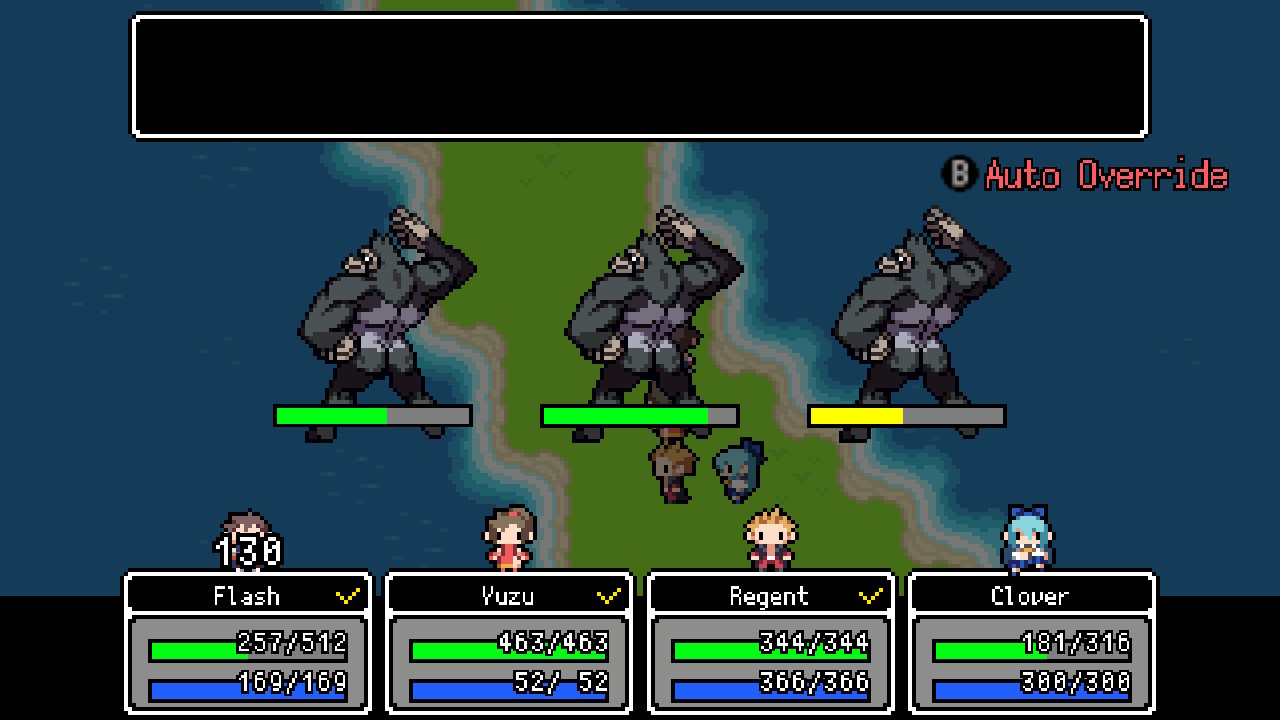The premise of The Longest Five Minutes is one that immediately grabs your attention. You’re thrust into the climactic final battle of an old-school Japanese RPG, only you–playing as the main hero–have been afflicted by the sort of amnesia that usually hits at the beginning of those games. You’ve forgotten everything: your name, where you are, who your companions are, and why you’re currently being stared down by a fierce demon lord. As a five-minute climactic battle with the final boss ensues, you must pause time and dive deep into your subconscious, rediscovering and reliving your memories to rekindle your fighting spirit. Because of this, the proposed five minutes extends to hours of gameplay outside of your main objective.
It’s an interesting concept that turns the normal flow of RPG final battles on its head, and made me eager to piece together a story built from fragmented memories presented in classic turn-based RPG style. After seeing the lively character sprite animations and silly dialogue, I was eager for a sendup of RPG conventions in the vein of the excellent Half-Minute Hero games. Sadly, The Longest Five Minutes never realizes its full potential.
When our hero, Flash, has an elaborate flashback, scenes from his past play out as typical moments from 8- or 16-bit JRPGs: exploring towns and dungeons, conversing with NPCs and party members, and fighting parties of low-level enemies. These flashbacks are somewhat non-linear, letting you piece together a story from the disjointed bits that the hero remembers.










While you can blow through and recover each disjointed memory by completing its central objectives, there are usually a few side quests you can also embark on. Completing these quests and fleshing out the memories yields rewards in the form of “re-experience points” that increase your power in the ongoing fight against the Demon King. And depending on the choices you make both in the memory sections and during your climactic fight, the story can follow one of a few different branches, resulting in multiple endings.
It’s intriguing to go back to events like the hero’s first-ever date with a would-be love interest or the time when everyone faces their fears and decides to risk their lives by vowing to confront an otherworldly threat. Most of the time, however, you’re going to be stuck revisiting dungeons and completing fetch quests. That wouldn’t be so bad if your objectives were more surprising, but they tend to be bog-standard quests with bland dungeon design and simplistic puzzles. The optional side quests aren’t much better, ranging from lost-and-found errands to mini-games like a slot machine that will have completionists cursing.
One interesting side effect of the game’s disjointed nature is that every memory is essentially a self-contained adventure, making it quite easy to digest in small chunks. Even your money and items revert to presets every time you enter a memory, so there’s no need for time-consuming grinding or item/equipment management. This makes the game feel very breezy, and it’s possible to complete a single playthrough within eight to 12 hours, making it less of a serious time commitment than your typical RPG.











However, with items, equipment, and EXP never carrying over from memory to memory, exploring and fighting beyond what you’re required to do feels completely unnecessary. Even if you acquire cool stuff in a dungeon or get a lot of money off of enemies, it’s all going to vanish pretty quickly. This, in turn, makes meandering through uninspired mazes and quashing foes in extremely simplistic turn-based combat (which you’ll auto-battle through 99% of the time) a hassle rather than an enjoyable challenge. At least the towns are fun to romp through, and some cute NPC and party member dialogue adds a lot of charm to the game. Ultimately, though, it feels like a there’s a good amount of unnecessary, laborious fluff despite The Longest Five Minutes being quite lean.
The concept of The Longest Five Minutes is undeniably intriguing, and its retro-styled visuals, quirky personalities and dialogue, and moments of inspired, emotional storytelling give it a lot of inherent charm. But charm can only go so far to make up for a game’s flaws, and far too often, The Longest Five Minutes falls victim to stereotypical old-school JRPG drudgery like endless random encounters and annoying dungeons–the exact sort of thing it wants to deconstruct. Though its ambition is admirable, it ultimately doesn’t live up to the promise of its clever premise.
Website: LINK
Schreibe einen Kommentar
Du musst angemeldet sein, um einen Kommentar abzugeben.